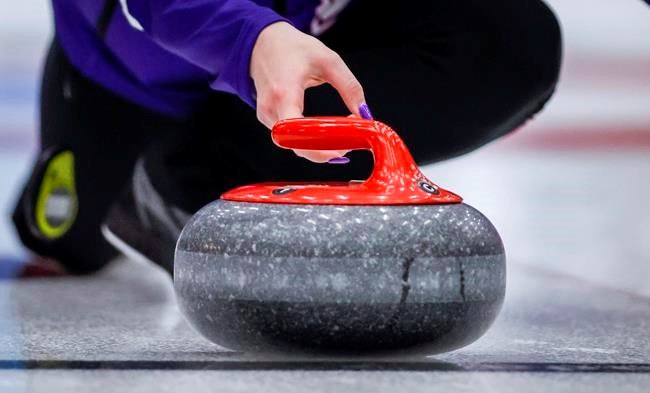CALGARY — The honour system is in play at the Canadian women's curling championship when it comes to hog-line violations.
A curler delivering a stone must release it before it reaches the hog line. Sensors in each stone’s handle determine whether the rock is released in time because of a magnetic strip embedded in the ice under the hog line.
A green light in the handle indicates a legal delivery, while a red light indicates a violation and the stone gets pulled.
But handle sensors were disabled at the Scotties Tournament of Hearts in Calgary's WinSport Event Arena after five hog-line violations in the second draw.
"Some spots were prematurely lighting up," said Curling Canada's chief ice technician Greg Ewasko. "We deemed that it's not really fair to the curlers."
Ewasko's initial theory that magnets in the arena floor to affix short-track speedskating pylons might be the culprit has been replaced by the possibility that rebar in the floor contains ferrous metal with magnetic properties that interfere with the handle sensor and the ice magnet.
"We found out that there's no magnets that are embedded into the concrete for speedskating. What we are thinking is the handles are attracted to ferrous metals, like rebar, with some magnetic components in it," Ewasko said. "We won't really know until we take the ice out.
"When they make a floor for hockey or curling, the concrete has rebar in it. Because there's so many thousands of rebar, they could have a few pieces in there made back in the day that have ferrous metals."
The stones' handles have been replaced in Calgary. They won't be used at the Canadian men's championship March 1-10 in Regina, Ewasko said.
The handles will be installed on stones for the national under-21 men's and women's championship March 24-31, in Fort McMurray, Alta.
"We are increasing the magnetic field so the handles can only pick up our magnet that we insert into the ice," he said.
Ewasko is working with a developer on handles that can do a lot more than detect hog-line violations. Spitting out split times and rock positioning digitally is in the works, Ewasko said.
"The plan is you're going to be sitting up on the media bench and you'll have a screen telling you how fast Rachel Homan delivered that rock and did she go down the same line?" he said.
"What we want to do first is we want to make sure the hog-line sensor works before we introduce the split time and the positioning of the rock on the sheet of ice.
"There's a lot of curlers out there that don't trust the handles because they've been malfunctioning. Meanwhile, I strongly believe we do need the handles because there's people that don't think the hog line exists."
Handle sensors malfunctioned at both the 2022 Olympic Games in Beijing, as well as the 2022 women's world championship in Prince George, –°¿∂ ”∆µ The honour system was instituted in both cases.
This report by The Canadian Press was first published Feb. 20, 2024.
Donna Spencer, The Canadian Press




